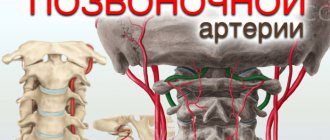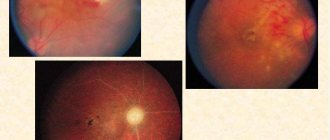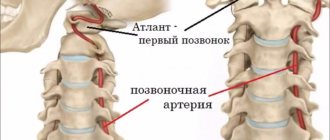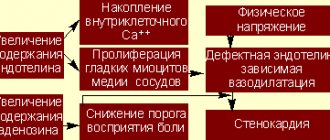Cushing's syndrome is a set of symptoms caused by high concentrations of the stress hormone cortisol. Cushing's syndrome can occur in people of all ages. Unfortunately, there are no known methods that can prevent the occurrence of this disease.
Incurable Cushing's syndrome and Cushing's disease cause other diseases such as hypertension, diabetes and osteoporosis and increase the risk of death. Therefore, to understand whether you are at risk, it is important to know what causes Cushing's syndrome. Correctly selected treatment gives a chance for a normal life.
What is Cushing's syndrome
The content of the article
Cushing's syndrome or hypercortisolism is a set of symptoms of the disease that arise due to excess cortisol in the body. The name of the pathology comes from the name of the outstanding neurosurgeon - Harvey Cushing, who was the first to observe and describe this disease.
The most common cause of Cushing's syndrome is the use of glucocorticosteroids, drugs for other diseases that increase the level of stress hormones in the blood.
There are two types of Cushing's syndrome:
- ActH dependent - Cushing's disease.
In this case, the pituitary adenoma (a gland located in the middle cranial fossa) secretes an excessive amount of ACTH - adrenocorticotropic hormone (corticotropin). This hormone has an indirect effect on the protein, carbohydrate and mineral balance of the body. However, its too high concentration has a negative impact on health.
- Independent of ACTH
. The pathology is caused by the occurrence of tumors of the adrenal cortex and extravasal tumors (adenoma or cancer).
When should you take a cortisol test?
With high or low blood pressure, with high blood sugar, with fat deposits in the waist area, decreased muscle mass, fatigue, pain in the abdominal cavity, the appearance of age spots on the skin, etc.
Along with cortisol levels, testing for the levels of the sleep hormone melatonin in the body is recommended - the principle of the examination is the same.
Prices for determining cortisol and melatonin levels in Slovenia Krka Thermae
Cortisol - daily profile - 4 saliva samples: 141.75 euro
Melatonin: 103.95 euro
Cortisol and melatonin: 195.51 euro
Symptoms of Cushing's syndrome
The symptoms of Cushing's syndrome are clearly visible, however, they are not symptoms characteristic only of this disease, which is why it is not always immediately diagnosed.
People with Cushing's syndrome most often experience problems such as:
- Weight gain and increased body fat, especially in the neck and face (called “buffalo neck” and moon face);
- characteristic silhouette - a thick face, a corpulent torso and very thin limbs (arms and legs);
- redness of the facial skin;
- stretch marks are clearly visible on the abdomen, thighs, buttocks and chest;
- skin problems - acne;
- menstrual irregularities and excessive hair in women;
- depression, sleep disorders and emotional instability;
- arterial hypertension;
- diabetes;
- brittle bones and osteoporosis;
- frequent and recurrent infections;
- susceptibility to bruising on the body;
- delayed bone growth in children, that is, dwarfism.
Most of these clinical signs appear in the advanced phase of the disease. Only a few of these may occur at first, making Cushing's syndrome difficult to diagnose.
CASE FROM PRACTICE
A woman came to the GGP program in an extremely stressful state. She was constantly anxious and tense due to stress at work. Only alcohol helped her cope with such a load. She simply could not calm down her excitement and fall asleep without a couple of glasses.
An important part of the program is meditation, which participants receive in recordings and have constant access to.
During the program, our client’s condition changed dramatically due to nutrition, physical activity and the entire system in general. But the main discovery and powerful healing tool for her was meditation.
This woman shared with us that she stopped drinking alcohol and started meditating every time she felt an impending wave of tension. She became much calmer, changed in appearance - younger, fresher. She returned to full, refreshing sleep. She learned to smile again and enjoy all manifestations of life.
Causes of Cushing's syndrome
The most common cause of this disease is the use of glucocorticoid drugs, which increase the amount of steroid hormones in the body. These medications are taken during the treatment of asthma, rheumatoid arthritis, and in patients after organ transplantation (they prevent rejection of the transplanted organ).
The stress hormone (cortisol), produced in the adrenal cortex, contributes to the formation of Cushing's syndrome. If the adrenal glands, controlled by the pituitary gland, produce too much cortisol, which can be caused by tumors of the pituitary gland or adrenal glands, then the excessive concentration of cortisol has an adverse effect.
Cushing's syndrome can also cause Cushing's disease, which is a type of overactive anterior pituitary gland. Then the cause of excessive ACTH concentration is a tumor.
Find something you like
Learning to relax is really helpful, especially if you want to manage stress. Taking up a new hobby is one way that can also help you learn a new skill. It doesn't matter what you do, as long as you enjoy it.
Photo by Steve Johnson / Unsplash
American scientists conducted a study of 50 former combatants who suffered from depression, post-traumatic stress disorder or substance abuse. They spent a month doing gardening and occupational therapy. The results showed a decrease in stress and a decrease in cortisol.
Think about what kind of activity you would like - perhaps drawing, music or gardening.
How to diagnose Cushing's syndrome?
To confirm the occurrence of Cushing's syndrome, a number of laboratory tests should be performed. Which doctor should you see to diagnose Cushing's syndrome? If you suspect a pathology, it is best to consult an endocrinologist. Women can turn to a gynecologist, as these specializations are closely related.
Based on the interview, the doctor will prescribe screening tests:
- Determining the level of cortisol in the blood - cortisol levels in healthy people are low in the evening, while in people with Cushing's syndrome its concentration increases at night. With such an examination, it is necessary to carry out the analysis in the evening.
- Dexamethasone inhibition test. The test consists of taking 1 mg of dexamethasone before bedtime. The next morning, you need to do a fasting blood test to determine your cortisol levels. The examination does not require a hospital stay and can be performed on an outpatient basis.
- Daily urinary excretion of free cortisol. To perform this test, after your first urine sample in the morning, collect 24 hours of urine in a container. The last urine to be collected is from the first morning urination (immediately after getting up) the next day. It is recommended to measure free cortisol in at least two daily urine collections.
- CRH stimulation test
. Corticotropin releasing hormone is taken by injection. The test consists of three determinations of cortisol and ACTH concentrations. Their concentration is measured for the first time before CRH administration, then 30 minutes after injection and 60 minutes after. In healthy people, maximum ACTH concentration occurs after 30 minutes, and cortisol after 60. Patients with Cushing's syndrome most often do not respond to CRH.
If the results show that there is an increased concentration of cortisol in the body, then it is necessary to conduct several visual tests, selected depending on the possible cause of Cushing's syndrome. These include:
- magnetic resonance imaging of the pituitary gland (if Cushing's disease is suspected);
- computed tomography or magnetic resonance imaging of the adrenal glands (if previous test results indicate the presence of an adrenal tumor);
- computed tomography of the chest and abdomen;
- Ultrasound of the thyroid gland;
- radioisotope tests.
Three recent imaging studies are designed to help find tumors that secrete excess adrenocorticotropic hormone (ACTH).
Identify stress triggers
A threat to life or a change in environment are stimuli that provoke anxiety and can become a trigger or stressor. Such irritants include physical pain, problems in relationships or at work, and financial difficulties. It is, of course, impossible to predict when you will hit your foot on a chair. But some types of triggers can be learned to recognize.
5 reasons why health and well-being depend on love
One of the first steps to relieve stress is to understand what causes it. I don’t want to remember or think about unpleasant situations again. But a stress diary will help you recognize irritants so you can learn to react less to them. It is not necessary to remember all the details of an unpleasant event - it is enough to write down the fact and try to analyze why what happened caused you a negative reaction.
Using a stress diary can help you find practical ways to deal with these situations. For example, avoid quarrels, learn to build personal boundaries in relationships and at work, and say “no” in time. Moreover, you will be able to identify hidden causes of stress such as hanging on social networks.
Cushing's syndrome and Cushing's disease - how are they different?
Cushing's disease is different from Cushing's syndrome, so the terms are not interchangeable. Although the symptoms of Cushing's syndrome are the same as in the case of Cushing's disease and the diagnosis is similar, the reasons for their formation are different. Cushing's disease is caused by a tumor of the pituitary gland located in the middle cranial fossa. The disease is treated surgically.
A dexamethasone inhibition test using an increased dose of 8 mg dexamethasone can help diagnose these two diseases. Cushing's disease can cause Cushing's syndrome.
Cushing's syndrome - treatment
Treatment for Cushing's syndrome depends on its cause. If the syndrome is a consequence of Cushing's disease, which is caused by an adenoma, then surgery is necessary. Through the sphenoidal sinus, the tumor is destroyed by laser or ionizing beams.
After such a procedure, you need to be under constant supervision of an endocrinologist, as there is a risk of relapse of the disease. It may happen that the operation was unsuccessful or removal of the adenoma is impossible. The patients are then treated with radiation therapy.
Cushing's syndrome caused by extruding tumors is treated with surgery or radiation therapy or chemotherapy.
An adrenal tumor, which can also cause Cushing's syndrome, can be treated by removing the affected gland. Usually, after such an operation, you need to take medications that will regulate cortisol levels, because the remaining gland may initially secrete too little of the hormone.
If the cause of the illness is glucocorticoid drugs, then you should consult a doctor who will reduce their dose. It is forbidden to stop taking medications on your own, as this may cause the development of other diseases.
Hormone content standards
Standard values may vary between laboratories. The analysis must be deciphered by the medical institution that performed the analysis. Average cortisol data depend on the patient’s age and are measured in nmol/l:
- in children under 10 years old – from 28 to 1049;
- from 10 to 14 years – from 55 to 690;
- from 14 to 16 years old – from 28 to 856;
- teenagers after 16 years – from 138 to 635 units.
Hormone concentrations may differ at different times of the day. The highest values are recorded in the morning, then cortisol levels drop and return to peak maximum parameters between 18 and 23 hours. In pregnant women, indicators can exceed standard values by 2-5 times, which is normal and not a sign of pathology.










